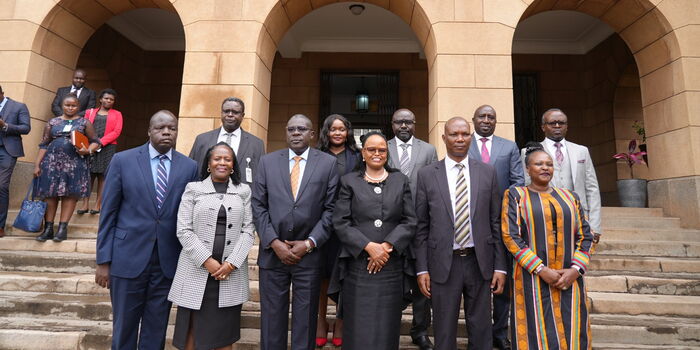The Supreme Court is set to issue an advisory opinion on Monday on whether the Independent Electoral and Boundaries Commission (IEBC) can conduct a boundary review in the absence of commissioners.
This is even as it merged that there is a constitutional crisis that is already facing the country, with the law stipulating that the exercise should have been concluded by March last year.
The apex court led by Chief Justice Martha Koome is set to deliver the ruling following an application made by IEBC seeking an advisory opinion to avoid a constitutional crisis.
”IEBC was required to conduct the delimitation of constituencies and wards between March 6, 2020, and March 6 2024 maximum period of 12 years after the 6th March, 2012 delimitation order… nonetheless, IEBC has not been able to undertake the delimitation process within the set timelines,” read part of the documents submitted to the Supreme Court by IEBC.
Chief Justice Martha Koome addressing the press during the swearing-in of the Independent Electoral and Boundaries Commission (IEBC) Selection Panel at the Supreme Court building on January 27, 2025.
Photo
Judiciary
”IEBC was required to conduct the delimitation of constituencies and wards between 6th March 2020 and 6th March 2024 maximum period of 12 years after the 6th March 2012 delimitation order. Nonetheless, IEBC has not been able to undertake the delimitation process within the set timelines,” it added.
The court will also advise the IEBC on whether it can conduct elections in constituencies and wards that have remained without representation for months following the nomination of some MPs to the Cabinet and the death of their representatives.
Additionally, the Supreme Court will provide guidance on the fate of 27 constituencies that are set to be scrapped from the country’s electoral map.
This happens even as lawyers and legal experts continue to draw mixed reactions over what would befall the country should the commissioners not be in office on time.
Abdikadir Mohamed, a senior counsel and constitutional lawyer argued that IEBC should be allowed to proceed with its activities as currently constituted, adding that it would be in good order.
”If we stay without commissioners until the next general elections for example, are you saying that we cannot hold elections? Whoever is there must be able to act and continue, that is what good order is about,” Mohamed stated.
”We are outside the timelines, can time be expanded so that we can undertake this? Can the secretariat be allowed to undertake the process? My view is that the commission is not just the commissioners,” he added.
Environment Cabinet Secretary Aden Duale affirmed that the country is in a constitutional dilemma, urging Parliament to also move to the Supreme Court to seek an advisory opinion on what role it can play to avert the crisis.
For an area to qualify as a constituency, the law was revised to require a minimum population of 72,000. However, the ongoing review seeks to set the threshold at 162,000, leaving 27 constituencies falling below the required population.
On Monday last week, President William Ruto appointed Kiome Lindah Gakii, Communication professional Oloo Adams, James Evans Misati, Nicodemus Kipchirchir Bore, Ambassador Koki Muli, Grignon Carolene Kituku, Tanui Andrew Kipkoech, Nelson Makanda and Fatuma Saman to be members of the IEBC panel.
President William Ruto during his maiden speech at the Bomas of Kenya after the former IEBC Chairperson Wafula Chebukati announced him as President-elect on August 15, 2022.
Photo
William Ruto


